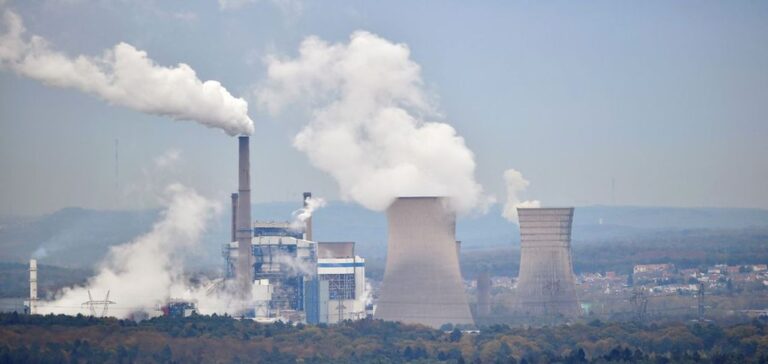The tall chimney is once again belching out its thick smoke, and an endless ballet of trucks is unloading a dark cargo, amidst the noise of the turbines: with the cold weather setting in, the coal-fired power plant in Saint-Avold, one of the last in France, is back in operation.
A major CO2 emitter, this plant was to close its doors for good at the end of March. But the government decided otherwise this summer to secure the country’s electricity supply, given the conflict in Ukraine and the setbacks encountered by EDF’s nuclear fleet.
Since 09:00 Monday morning, the Emile-Huchet power plant has been sending electricity back to the network.
The employees are “proud” to be “at the rendezvous”, says Thomas About, a 32-year-old shift supervisor, who was present at the end of March when the 41-year-old unit was closed.
This restart could have happened earlier, in early October, but temperatures remained mild.
“We were waiting for the electrical system to need us,” says Camille Jaffrelo, spokesperson for GazelEnergie, the company that owns the facility.
A revival that is the result of a “great collective success” according to Mr. About. Because he and his fellow coal workers say it: they have “the collective interest at heart”.
Mixed” feeling
Total cost of the operation for GazelEnergie: 500 million euros, including 400 million “for the coal and its logistics”, Camille Jaffrelo details.
Prior to the restart, the company also carried out extensive renovation work on the facilities.
The law for purchasing power voted at the beginning of August included a measure allowing GazelEnergie to rehire employees this winter.
More than half of them were retiring and the younger ones had to be reclassified within the company’s new projects.
A total of 70 of them attended.
If the generous bonus of 5,800 euros gross per month offered to employees for this winter has weighed in the
But “there’s more to it than that”: “people like their work” and “want to be of service to something”, explains Sylvain Krebs, head of the coal park, 47 years old, 23 of them in the power station.
Recalling the young retirees was also an “obligation” for the company, which needs their skills: coal, “it’s heavy industry, it’s not by snapping your fingers that you are trained,” says Krebs.
In front of the 420,000 tons of coal stored in the open air and for which he is responsible, he has a “mixed” feeling about this recovery, because he is convinced that we must “turn the page” on this highly polluting resource, which has sustained Lorraine for nearly two centuries.
For this winter, the plant will burn between 500,000 and 600,000 tons, at a rate of 5,000 to 6,000 tons per day.
The plant has the right to operate 2,500 hours until March 2023 to “secure the electrical system this winter,” says Camille Jaffrelo.
When running at full capacity, Emile-Huchet can produce up to 600 megawatt hours and is capable of supplying one third of the homes in the Grand Est region.
Playing the yo-yo
There is only one other coal-fired power plant still open in France, in Cordemais, Loire Atlantique.
In France, more than 67% of the electricity produced is of nuclear origin, the share of fossil fuels being 7.5% in 2020, including 6.9% of gas and only 0.3% of coal.
As for a possible resumption for the winter of 2023-2024, GazelEnergie calls on the government to make a decision as soon as possible.
“It is out of the question for us to send our employees home in April with no visibility,” insists Ms. Jaffrelo.
“It is not humanly possible, we can not play yo-yo with 150 people,” she added, asking the government to decide “before April so that this plant can operate” possibly next year.
Once definitively closed, the Emile-Huchet power plant will be dismantled to make way for new projects, in particular a biomass boiler that will supply heat to the industrialists of the nearby Carling chemical platform, which GazelEnergie hopes to bring into service by the end of 2024.






















